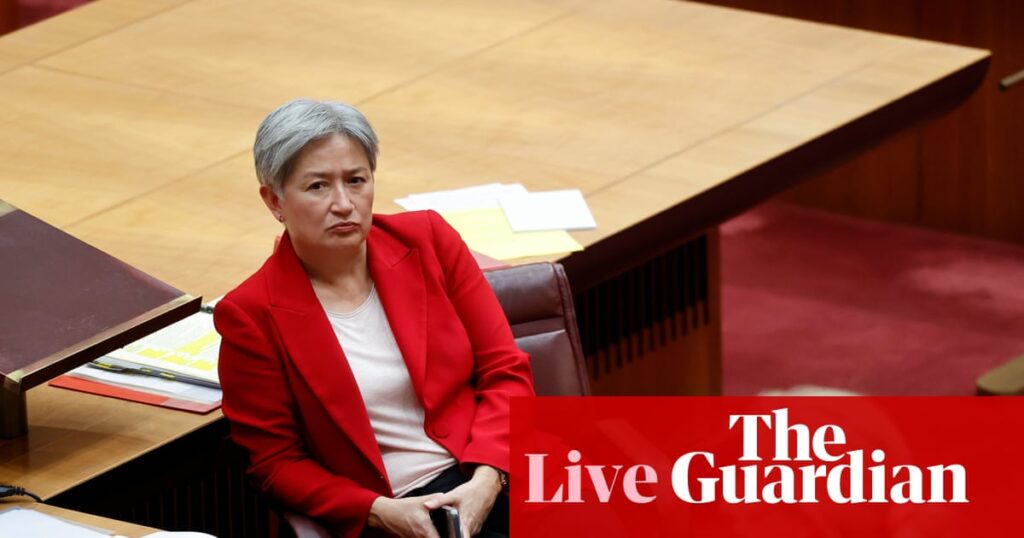Labor minister met with Trump-appointed FBI director
The FBI chief, Kash Patel, has met with the minister for home affairs, Tony Burke, Penny Wong has confirmed, drawing criticism from the Greens.
The director of the US Federal Bureau of Investigation today opened the bureau’s first-ever office in New Zealand in what he said was an attempt to help counter China’s activities in the Indo-Pacific, crack down on issues including cybercrime and strengthen protection of the Five Eyes nations.
Wong declined to say whether she supported the FBI expansion but confirmed Patel met Burke, speaking to the ABC.
Patel is a Donald Trump ally who has made headlines in recent weeks over the Epstein controversy and previously praised the QAnon conspiracy-theory movement.
Greens senator David Shoebridge criticised what he described as “secret meetings,” demanding Burke share what he discussed with Patel. He told the ABC:
Meetings that nobody knew about with a highly controversial Trump appointee … that’s not a good look for any government …
I can understand why Minister Burke wanted nobody to know about it but they have an obligation to be honest with the Australian public.
Key events
Shadow minister for Indigenous Australians offers full support for Labor to turn around worsening outcomes
The shadow minister for Indigenous Australians has offered Labor support to turn around worsening outcomes for First Nations communities as new data shows just four of 19 Closing the Gap targets are on track.
Youth and adult imprisonment rates, children in out-of-home care, suicide and childhood development are among the outcomes continuing to deteriorate.
Kerrynne Liddle, also the Coalition’s spokesperson for social services, said she wanted to help the government turn things around. She said:
The minister talks about bipartisanship and she has my full support as I am sure she does many people, to actually focus and make progress in these issues.
I’ve been calling from the beginning for more accountability on how the funding has been spent and what progress it is making in terms of outcomes … It’s also about bureaucrats doing more about those programs, that they manage to make sure that they are being delivered in the way it was intended.
Liddle also endorsed the Northern Territory government’s move to reintroduce the use of spit hoods in youth detention centres.
I don’t [think] I wouldn’t appreciate being spat at it. I’m sure nobody would appreciate that in the workplace. But [what] we need to do is work with these children earlier … so that they don’t feel the need to just spit at people.
Labor minister met with Trump-appointed FBI director
The FBI chief, Kash Patel, has met with the minister for home affairs, Tony Burke, Penny Wong has confirmed, drawing criticism from the Greens.
The director of the US Federal Bureau of Investigation today opened the bureau’s first-ever office in New Zealand in what he said was an attempt to help counter China’s activities in the Indo-Pacific, crack down on issues including cybercrime and strengthen protection of the Five Eyes nations.
Wong declined to say whether she supported the FBI expansion but confirmed Patel met Burke, speaking to the ABC.
Patel is a Donald Trump ally who has made headlines in recent weeks over the Epstein controversy and previously praised the QAnon conspiracy-theory movement.
Greens senator David Shoebridge criticised what he described as “secret meetings,” demanding Burke share what he discussed with Patel. He told the ABC:
Meetings that nobody knew about with a highly controversial Trump appointee … that’s not a good look for any government …
I can understand why Minister Burke wanted nobody to know about it but they have an obligation to be honest with the Australian public.
Wong: ‘of course’ conditional recognition of Palestine being discussed
Penny Wong has said the government is “of course” considering moving to recognise a Palestinian state in September in line with Canada, the United Kingdom and France.
The foreign minister said the Albanese government welcomed Canada’s announcement it planned on a conditional recognition of a state of Palestine in which Hamas had no part when the United Nations’ general assembly meets.
Asked whether Australia remained open to a similar declaration in September, Wong said:
Of course these are discussions which are ongoing … This is something that we are thinking very carefully about, just as we think carefully about what can we do to contribute to bring about the ceasefire in Gaza.
We know we are not a central player but what we can do is what we have done which is call for cease-fire, join with others.
Wong would not be drawn on whether Labor was committed to matching leading allies, reiterating the government’s focus on securing peace through a two-state solution. She told the ABC:
We welcome the momentum towards the pathway to peace and that is what two states is about. …
I hope what happens in New York in September is we see the hostages released, we see the commitments from the Palestinian Authority and others in the region about the security of Israel, the demilitarisation of the Palestinian state and a move towards recognition … That’s what we want.
Retail sales grow by fastest in more than two years
Households have picked up their retail spending by the most since 2023, easing concerns that sales to consumers were collapsing. The final release of retail sales data shows household spending picked up 1.2% from May to June, taking the annual lift to 4.9%.
Household goods retail sales rose a strong 2.3% over the month, helped by furniture and a big swing in electrical goods, which Robert Ewing, the ABS head of business statistics, attributed to the Nintendo Switch 2:
After steady growth throughout the year, mid-year sales events increased spending on discretionary items like furniture, electrical goods and clothing items
Turnover for electrical and gaming retailers was lifted further by the much-anticipated launch of the Nintendo Switch 2, which delivered record sales.
Analysts at UBS said the uptick was enough to allay concerns spending could slide, writing in a note:
We could now be seeing a shift in consumer spending momentum under way, after having earlier disappointed. Tailwinds of rising household disposable income from tax and interest rate cuts and still low unemployment should support [spending].
The ABS looked back at the statistics series in farewell before it’s replaced with new spending data, and noticed a major change in household’s spending. Food once was the single biggest share of household final consumption expenditure – at one-sixth in 1964 – but fell to less than a tenth of spending by 2024. Housing costs are now the biggest expense, up from about a tenth in 1964 to a quarter in 2024.
Luca Ittimani
Thanks so much to Krishani Dhanji for guiding us through the first sitting fortnight of the 48th parliament! I’ll be with you for the rest of the day’s news.

Krishani Dhanji
That’s it from me today, thank you so much for joining me on the blog this sitting fortnight.
I’ll leave you with the wonderful Luca Ittimani for the rest of the afternoon.
Tl:dr — what happened in QT today?
-
Despite the vague lack of energy in the chamber, there were a lot of energy questions today for Chris Bowen about whether energy prices have been increasing or decreasing.
-
The government’s dixers were predictable – Hecs, penalty rates, healthcare and energy – but Jason Clare did provide an update on protecting children in childcare, which was supported by the opposition leader, Sussan Ley.
-
Liberal MP Ben Small got kicked out.
-
Helen Haines asked what the government will do for the tens of thousands of people waiting for a home care package before the government brings more online (the packages were supposed to be rolled out from July 1). The government didn’t provide any specific measures.
-
Look, we’re at the end of the sitting fortnight, and some people (including Jim Chalmers) could not have walked out of the chamber faster as soon as QT was over.
Ley backs Labor’s childcare bill but notes the ‘next part is very difficult’
Delving back into question time briefly, there was a moment of unity in the chamber over the government’s childcare bill.
During a dixer, the education minister, Jason Clare, addressed the latest allegations relating to a childcare worker in New South Wales.
This is the start, not the end. To be brutally honest, this work will never end. And the sickening (alleged) news we heard from the Australian Federal Police in the last few hours is a reminder of why this is so important. There is a lot of work we need to do together to rebuild trust and confidence in the system that parents need to have confidence in.
Jason Clare and the attorney general, Michelle Rowland, will meet with their state and territory counterparts next month to reform the working with children checks system and discuss rules around CCTV footage.
Sussan Ley stood up afterward and said the government had done good work but that the “next part is very difficult”.
Sitting down with the states and territories, as we have all done in ministerial positions in the past, can descend into a talkfest and ministers depart to their state and nothing happens. We cannot afford to have that this time.
Question time ends after paving paradise
There have been so many points of order today, the opposition have even made a point of order on a dixer. The PM tried to have a bit of a go at the “split” opposition when he was watching Sky News this week:
There was a national leader in the studio with Laura Jayes but in the corner in the little box there was … the renegades out the front along with one or two Liberals in the corner. A split screen showing a split party.
He’s talking about the press conference that Barnaby Joyce and a group of other Coalition members made raging about net zero.
Alex Hawke gets up, to no avail, and Anthony Albanese says he misses the former manager of opposition business, Paul Fletcher.
Every time the new manager of opposition business gets up you feel a little nostalgic for Paul Fletcher. Joni Mitchell was right, you don’t know what you’ve got until it’s gone.
Put me in a big yellow taxi and get me outta here … with that, QT is over for another day.
Opposition continue attacks over quarterly power price rise
Bowen is back, with another question from the opposition on whether today’s data by the Australian Energy Regulator shows energy prices are going up or down.
Despite all the numbers – which we don’t always get in question time – we don’t seem to be getting particularly far on the issue today.
Bowen says prices have risen in the last quarter, but as per his previous answer, prices have gone down since Labor first came into government.
Quarterly price rises, wholesale prices rose. That is what the report said, thanks for noticing.
Bowen says that the reason wholesale prices have dropped over the last three and a bit years is because of all the new renewable energy that the government has helped bring online.
Wong admits not possible to track if goods from sanctioned nations might be imported via a third country

Sarah Basford Canales
Earlier in Senate question time, the independent senator Fatima Payman asked Penny Wong about reports of an oil tanker docked in Western Australia believed to be carrying Russian fuel processed in India.
While Australia has joined other nations in banning the import of Russian oil in response to its invasion in Ukraine, it’s possible Russian oil is still being sold in Australia after it has been refined in a third country.
Payman asked Wong whether the Albanese government had assurances Russian oil was not being sold in the country, given the sanctions imposed on them.
Wong responded:
I’ve said publicly, regrettably, the mechanisms we would need to track and monitor all energy products via third countries, are not in place in those countries, and obviously, we’ll continue to look at what options we can utilise to place further pressure on Russia’s oil revenues …
Australians do expect businesses to try and avoid their supply chains from inadvertently funding Russia’s illegal and immoral invasion of Ukraine. Certainly, the government does call on businesses to uphold that responsibility.
But the answer to the question, Senator, is … we have sanctioned. We’ve increased those sanctions, including on the shadow fleet. But secondly, regrettably, there are not the mechanisms in third countries to enable all of the issues you raised to be tracked.
Albanese agrees with Katter than Glencore ‘should back the town that backed them’ after factory closures
We’re back to the crossbench, and Bob Katter asks the prime minister about the closure of the Mount Isa underground copper operation, owned by Swiss multinational Glencore. He also asks whether the government will initiate an east coast gas reservation policy to protect industry, including the Mount Isa fertiliser plant.
Anthony Albanese acknowledges the workers who are losing their jobs with the closure – around 500 – and says Katter is right to call the closure out.
Australia has been good to Glencore and they need to be good back to Australia. They should back the town that has backed them and has helped build the wealth of their shareholders …
I assure the member I will continue to work constructively with him, as I always have, and that the industry minister is very engaged in this issue along with a whole of government response.
Katter’s son, the Queensland state MP Robbie Katter, is also in the House today in the public gallery.
Chalmers on superannuation: it’s possible to disagree with Paul Keating
The shadow treasurer, Ted O’Brien, is up now, and asks Jim Chalmers about the superannuation tax. He quotes Paul Keating, who’s told the media the tax is “unconscionable” and asks Chalmers whether Keating, his political idol, is wrong.
“No disrespect to Paul,” Chalmers says, but sometimes they don’t agree on policy.
It is a matter of public record that I value my relationship with Paul Keating, someone I have known for a long time and somebody who I continue to admire.
It is possible to admire Paul Keating and respect him and to occasionally have a different view to Paul Keating and this is what has happened on this occasion and I have said that publicly on a number of occasions, no disrespect to Paul when I say it.
He ends saying “I won’t be taking lectures on superannuation from those opposite” and accuses the Coalition of “hating” super.
Aged care minister says additional 80,000 home care packages to be rolled out from November
The next crossbench question goes to Helen Haines, who asks the government what they’re doing to help families who are waiting for home care packages that have been delayed.
She says the government ignored calls to bridge the gap by immediately funding 20,000 home care packages. There are currently 87,000 people on the home care wait list.
Sam Rae, the new aged care minister, says he acknowledges that the Australian population is ageing and demand for home care packages are growing.
After an interjection from Haines, asking what the government will do before the promised packages come online, Rae still won’t detail exactly how the government will look after those still waiting.
From 1 November, [the government] will roll out an additional 80,000 packages in the first 12 months. Until then, over the course of the period between now and November my number one priority is ensuring that older people continue [to] receive the care and services that they need, and until November we continue to assign the packages each and every week in accordance with the national priority system.


